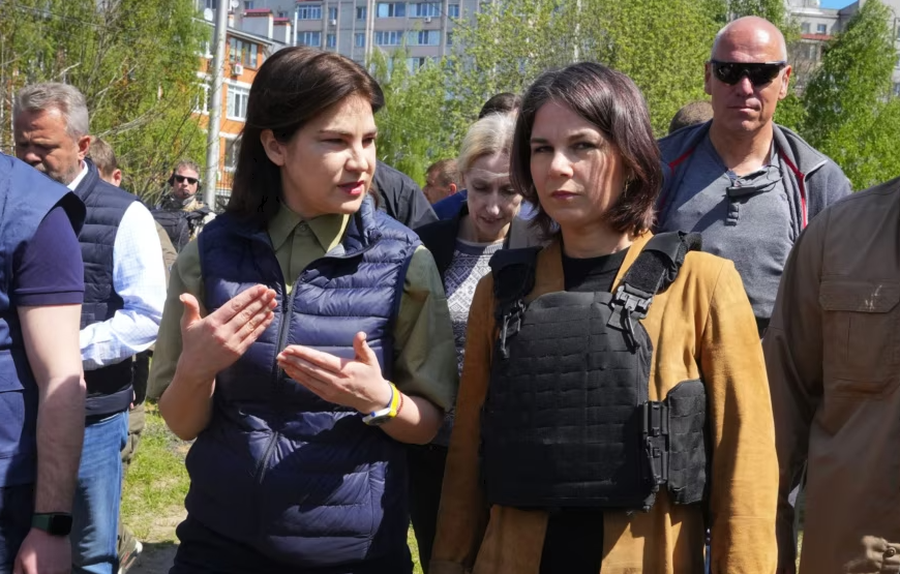
German Foreign Minister Annalena Baerbock, during a surprise visit to Kiev, has warned against Russia's obstructionist tactics in peace negotiations to end the war in Ukraine.
The German diplomat, who is on her ninth trip to Ukraine since the Kremlin launched its full-scale occupation in February 2022, said she believes Kiev is ready to sign a peace deal amid intensifying negotiations led by the United States.
"At the upcoming meeting of NATO foreign ministers, we will make it clear to the American side that we must not fall prey to Putin's obstructionist tactics," she said in a statement after arriving in the Ukrainian capital on April 1.
Baerbock's statement comes after US President Donald Trump threatened Russia with new tariffs on oil products if Moscow blocks his ceasefire initiatives, while also saying that Ukrainian President Volodymyr Zelenskyy will face "big problems" if he does not sign a deal on critical minerals with Washington.
"He's trying to pull out of the rare earths deal, and if he does that, he's going to have big problems," Trump told reporters on March 30, referring to the Ukrainian president.
"We made a deal on rare earths. And now he's saying, 'you know, I want to renegotiate the deal.' He wants to be a member of NATO, but he'll never be a member of NATO. He understands that," Trump added.
On March 28, the Ukrainian government said it was still reviewing a draft agreement from the United States on the country's rare earth minerals, amid reports that Washington had changed the terms of the deal several times.
Ukraine's Economy Minister Yulia Svyrydenko announced at a government meeting that Kiev is preparing its own position on the agreement, but MPs will express their position only when a consensus is reached. Before that, she said, public discussion would be harmful.
Ukraine has significant deposits of critical minerals, including rare earths, although their exact quantity remains uncertain. These minerals are highly valued for their use in defense technologies, as well as in devices such as computers, smartphones, and batteries.
Ukraine and the United States agreed earlier this month to a comprehensive agreement on the development of Ukraine's critical mineral resources. Efforts to finalize the deal had previously failed on February 28 after a tense standoff between Trump and Zelensky at the White House.
Meanwhile, earlier on March 30, Trump said he would impose secondary tariffs of 25 to 50 percent on Russian oil if he believes Russian President Vladimir Putin is blocking his efforts to end the war in Ukraine.
Trump said during a telephone interview with NBC that he was "very angry" and "frustrated" when Putin called for the creation of a transitional government in Ukraine, which could result in the ouster of President Zelensky.
"If Russia and I don't reach an agreement to stop the bloodshed in Ukraine, and if I think it's Russia's fault - which it may not be - but if I think it's Russia's fault, I will put secondary tariffs on all the oil coming out of Russia," Trump said.
"This means that if you buy oil from Russia, you can't do business in the United States," he added. "There will be a 25 percent tariff on all oil, a 25 to 50 percent tariff."
Trump added that these trade measures would be implemented within a month if a ceasefire agreement is not reached.
This highly sensitive diplomatic moment comes after the White House announced on March 25 that both Russia and Ukraine agreed to a ceasefire and to allow navigation in the Black Sea, as well as not to attack each other's energy facilities.
Kiev says the ceasefire should come into effect immediately, while Moscow has said it will only respect it after the partial lifting of sanctions on Russian companies and banks involved in international food trade.
Tougher stance on Putin
Trump's comments mark a shift from the softer approach the White House has taken toward Russia since the US president made ending the war in Ukraine a foreign policy priority. They also come after he had previously criticized Zelensky, saying he was "tired" of his handling of the war and calling him a "dictator without an election."
Trump told NBC that he will speak with Putin this week.
While the United States is leading diplomatic efforts to reach a ceasefire agreement, Russia has intensified attacks on the city of Kharkiv in Ukraine.
Air strikes in the northeastern Ukrainian city on April 1 injured three people and caused fires in several industrial buildings, as well as damaging two gardens, officials said.
A day earlier, Kiev accused Moscow of a "war crime" after Russian drones hit a military hospital.
The attack hit Kharkiv, Ukraine's second-largest city, as part of an assault that also targeted a shopping mall, residential buildings and other facilities, killing two people, according to authorities.
The Ukrainian military's general staff accused Russia of "violating the norms of international humanitarian law" in its attack, which it described as "deliberate and targeted bombing."/ REL (A2 Televizion)











